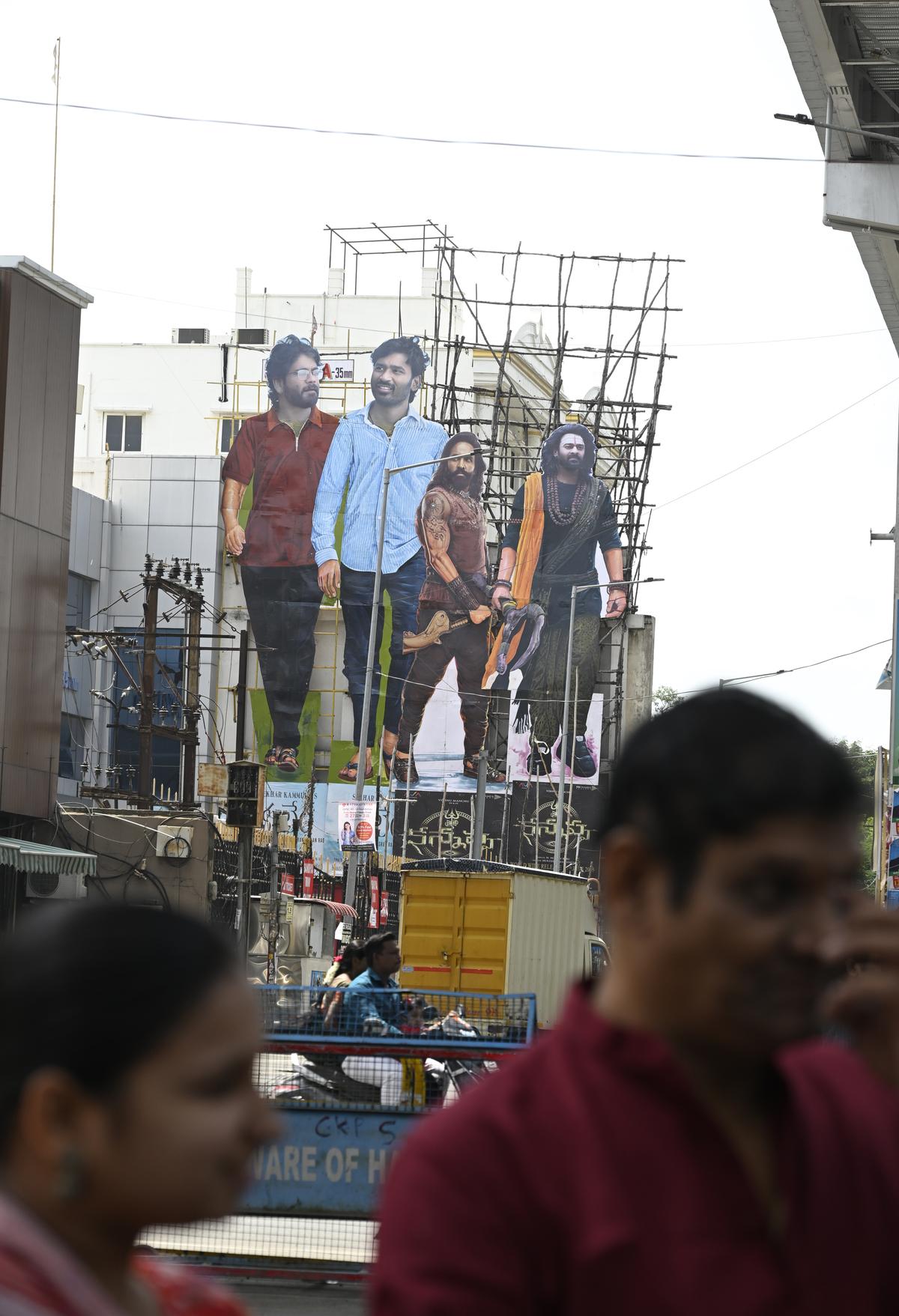Telugu film industry intensifies measures to curb piracy, after suffering loss of ₹3700 crore in 2024. Court orders to restrain websites and other measures are being explored
It was barely a few minutes into the 8.45 a.m. show of Thammudu on July 4 when the routine calm of Prasads’ multiplex in Hyderabad was broken. A staff member called out a viewer spotted filming a scene from the Telugu action drama, headlined by Nithiin and produced by Dil Raju’s Sri Venkateswara Creations. The man, as it turned out, was just a zealous fan hoping to grab a quick snapshot for social media. But the theatre management wasn’t willing to take chances.
In normal times, this might have been brushed off with a warning. But the atmosphere around film piracy has shifted — and for good reason. The increased scrutiny follows the arrest of Jana Kiran Kumar, a 29-year-old air-conditioner technician from Vanasthalipuram, Hyderabad, at the beginning of this month. He is accused of illegally recording and leaking nearly 40 Telugu films. His operations, police said, were closely tied to major piracy platforms.
The arrest is likely just the beginning, as law enforcement agencies tighten the noose around piracy syndicates that are bleeding the industry dry.
Rajkumar Akella, chairperson of the anti-piracy cell of the Telugu Film Chamber of Commerce, says the Telugu film industry alone lost an estimated ₹3,700 crore to piracy in 2024.
Infobox 1: ₹23,000 crore revenue loss
According to the anti-piracy cell of the Telugu Film Chamber of Commerce, the Indian film industry has suffered an estimated loss of ₹23,000 crore, and the Telugu film industry alone has suffered an estimated loss of ₹3700 crore in 2024, owing to piracy. “This loss is far more than the legitimate revenue of the industry,” says Rajkumar.
The estimate was made taking into account the admission rates in cinema halls and the number of downloads from piracy websites. “More than 3,70,00,000 pirated links have been downloaded for films released in 2024. This is only 50% of the illegal downloads we were able to track, since not all websites disclose the number of downloads,” he adds.
Silent killer
Piracy is a silent killer that the Telugu film industry is grappling with, one that continues to operate in the shadows, chipping away at revenues with alarming consistency. This summer, the director of a star-led Telugu film, which was dubbed and released in multiple languages, confided to this journalist that both he and the lead actor chose to stay quiet about the piracy issue. Their fear? Drawing attention to it might inadvertently lead more people to these illegal sites.
“A team is working round the clock to take down pirated links and film clippings from all digital platforms. If we talk about it, even those who are unaware of these websites might get curious,” the director had said.
That fear is not unfounded. Back in February, soon after Chandoo Mondeti’s Thandel starring Naga Chaitanya and Sai Pallavi hit theatres, pirated versions of the film began doing the rounds online. The film’s producers Bunny Vasu and Allu Aravind highlighted the issue during a media interaction. But soon after, the film’s team noticed a spike in visits to piracy platforms. “Our intention was to condemn the practice, but it had an unexpected fallout,” says producer Srinivas aka SKN, a longtime associate of Aravind’s Geetha Arts.

Sai Pallavi and Naga Chaitanya in ‘Thandel’.
| Photo Credit:
Special Arrangement
Actor-producer Vishnu Manchu, too, recently revealed on X (formerly Twitter) that more than 30,000 pirated links of his film Kannappa had to be taken down.
It is no surprise, then that many filmmakers continue to tread carefully, deliberately avoiding mentioning piracy websites in public. These platforms have come to be treated like the Voldemort of the film world: those that shall not be named.
Proactive measures
However, they now want to go a step further, by raising awareness that piracy isn’t limited to just recording or sharing film content. Even watching pirated movies is a punishable offence under the law.
To that end, several representatives of the Telugu film industry have been working closely with both State and Central government authorities to devise a comprehensive plan to combat piracy.

The booming piracy market is proving to be a major threat to Telugu cinema. Posters of ‘Kuberaa’ and ‘Kannappa’ in the background.
| Photo Credit:
Ramakrishna G.
A prominent producer, who is part of these efforts, says on condition of anonymity: “Private tech teams hired by production houses can only do so much. They are focused on taking down pirated links that have already been uploaded. And new ones will surface. The problem has to be tackled at its root — nab those who illegally record films for piracy websites, track the servers that host these websites and hold them responsible. Nothing will change unless the culprits are arrested, named and shamed. This is possible only with help of the government and the cyber crime wing.”
Infobox 2: Watching pirated content is illegal
Following the arrest of Jana Kiran Kumar, the Hyderabad police have reminded the public that piracy is a punishable offence under the Copyright Act, 1957, and Cinematograph Act, 1952 (amended in 2008). Recording or exhibiting pirated films, or even possessing them for profit, can attract up to three years of imprisonment, a fine of ₹1 lakh, and an additional ₹20,000 fine for each day the offence continues. In cases involving forgery and organised sharing, the punishment can extend to life imprisonment.
Quantum of losses
The producer admits that, in the larger scheme of governance, film piracy might appear like a trivial concern — especially when the government deals with far more pressing issues. But the magnitude of the problem tells a different story. Piracy doesn’t just drain revenue from the film industry, it also robs the government of substantial tax income.
Rajkumar explains, “In recent years, the footfall in cinema halls has fallen by 50% and the major reason is piracy.” He points out that the Telugu film industry was the first in India to set up a dedicated anti-piracy cell. “We did extensive spadework and gathered data on piracy links and identified the hosting servers of websites, and submitted them to the State and Central government authorities so that the police can swiftly act on complaints.”
While social media platforms like YouTube, X, Facebook and Instagram usually comply with takedown requests and remove pirated clips or links, dedicated piracy websites are a tougher nut to crack. Many of them lack any redressal mechanism, and those that do often ignore complaints. It is not as simple as tracking down an IP address, he says, adding, “Rogue websites such as movierulz, ibomma and several others operate anonymously using offshore hosting servers such as Cloudflare. These servers feign ignorance of the content being distributed on their problems. Despite repeated complaints, they do not respond.”
Telegram, adds Rajkumar, has also proved to be a thorn in the flesh, as pirated links continue to be shared widely on the messaging platform, making enforcement even harder.
Modus operandi
Piracy has typically been found to take place at two stages. The first is during a film’s theatrical release, when people hired by piracy websites illegally record footage inside cinema halls. These recordings are then passed on to website operators, who upload the content online within hours. The second phase begins when a film releases on OTT platforms. Pirates use sophisticated software tools to bypass encryption and extract high-definition footage, which is then uploaded to their own websites. This dual threat impacts both box office collections and digital streaming revenues.
In the case of Jana Kiran Kumar, cyber crime authorities disclosed in a press statement that his entry into the piracy network began with a meme referring to the piracy group ‘1TamilMV’. Intrigued, Kumar contacted the group via a Proton Mail address, eventually shifting the conversation to Telegram. There, he was assigned the job of recording Telugu film releases in exchange for payments ranging from USD 300 to 400, all of it routed through cryptocurrency.
To carry out his assignments, Kumar booked tickets online, smuggled a mobile phone into the theatre by hiding it in his shirt pocket and discreetly recorded the films. The raw footage was then transferred to the piracy group through Telegram. He received payments in Bitcoin, which were later converted into rupees via Indian crypto platforms such as ZebPay and CoinDCX.
Among the films he is accused of pirating are Single, Pellikani Prasad, 14 Days Love, Thandel, Game On, Kismat and Rajadhani Files.
Kumar’s arrest was the result of a formal complaint filed on June 5 by Yarra Manindra Babu from the anti-piracy cell of the Telugu Film Chamber of Commerce, in connection with HD pirated versions of Single, a Geetha Arts production starring Sree Vishnu and Vennela Kishore.

Sree Vishnu and Ketika Sharma in ‘Single’.
| Photo Credit:
Special Arrangement
The film, which released on May 9, had its pirated versions circulating across multiple platforms within hours of its theatrical debut. According to police, forensic watermark analysis helped trace the source of the leak to a specific cinema hall. Based on this evidence, an FIR was registered, invoking multiple sections of the Information Technology Act, Bharatiya Nyaya Sanhita, Copyright Act and Cinematograph Act.
Shape-shifting piracy
In the analog era, piracy existed in the form of video cassettes and CD-ROMs, typically sold a few days after a film’s release, in select pockets of urban markets. “Back then, several films enjoyed a 50-day or a 100-day theatrical run and the pirated copies were mostly of inferior quality. Digital technology has made it possible for pirates to upload HD-quality prints within a few hours of a film’s release, and these are shared widely. We have also seen important sequences of a film being streamed as clippings on Instagram Live. It is tough to keep tabs,” SKN points out.
The impact of piracy in the digital age has been especially damaging for an industry already reeling from falling footfall in theatres. Multiple factors are behind this decline — the shrinking window between theatrical and OTT releases, high ticket prices and the escalating cost of food and beverages in cinema halls. Piracy has only worsened the situation.
Today, only those films that generate enough buzz prior to release manage to draw crowds during the opening weekend. If the word-of-mouth is strong, the momentum carries through for the next couple of weeks.
But for films that receive mixed reviews or poor word-of-mouth, piracy delivers a lethal blow. Industry observers note that such films are particularly vulnerable — audiences on the fence often skip a theatre visit, opting instead to wait for the OTT release or watch pirated versions online. Even in the case of successful films, the availability of pirated links affects repeat viewership.
SKN recalls the release of his 2018 film Taxiwaala, starring Vijay Deverakonda, which faced a major piracy scare due to a data storage leak. “Luckily, social media was not as pervasive then. The movie managed to do well in theatres. But not every film is that lucky.”
Swift action and awareness
Time is of essence to crack down on piracy so that a new film is not affected, says a producer: “FIRs have to be filed at the earliest and the police have to help arrest the culprits swiftly.”
Industry representatives also point out that several users of piracy apps and websites are unaware that they are watching illegal content. A producer adds, “Some of these websites have even begun showing advertisements, thereby legitimising the platform’s revenue earning mechanism. There is a need to step up awareness.”
Restraining order
Industry insiders reveal that for two recently released Telugu films, both backed by prominent production houses, the Hyderabad district court issued restraining orders against more than 110 websites known for circulating pirated content. The court directed those sites not to host, share or stream the films without authorisation. Copies of the court orders are with The Hindu.
Akella calls the court’s intervention a milestone in the industry’s long-standing battle against piracy. In one of the two cases, the Ministry of Information and Broadcasting also stepped in, issuing a notification warning all websites against illegally publishing content and stating that stringent legal action would follow in case of non-compliance.
But the fight is far from over. Industry observers say further legal measures are being explored. Despite the court’s orders, piracy websites may adopt evasive tactics by masking their identities, redirecting users to alternate links or renaming their website extensions. Even so, in an industry where every Friday counts, the hope is that with each crackdown, the screen gets a little safer and the shadows where piracy thrives grow a little smaller.